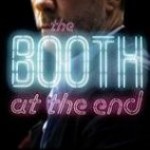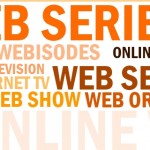 I recently discovered the Booth at the End during a very boring Saturday. With nothing better do due I decided to check this show out after seeing it advertised several times on Hulu. This became one of those odd moments where I (A) wanted to kick myself for not finding it sooner and (B) was glad that I was able to watch the first two seasons all in one go.
I recently discovered the Booth at the End during a very boring Saturday. With nothing better do due I decided to check this show out after seeing it advertised several times on Hulu. This became one of those odd moments where I (A) wanted to kick myself for not finding it sooner and (B) was glad that I was able to watch the first two seasons all in one go.
The Booth at the End is a web series originally produced by the FX network website. Despite a bit of research I could not figure out if they are still involved or not. Either way it is currently showing exclusively on Hulu. It is what I have termed a type one web series, which is a series that is produced by a professional studio and using professional actors for distribution on the web.
The premise is that there is a man who sits in a booth in a diner. People will come to him with something they want. He will make a deal with them, where he gives them a task to do and when they complete the task they will get what they want. Part of the deal is that the people have to check in with the man and give him an update on how their task is progressing. The things the people want can range from money, to curing a child of cancer to bringing the dead back to life.
The tasks will often not appear to have anything to do with the goal, but are always something the person asking would not do of their own will. The man who wants his son cured of cancer must find and kill a 5 year old girl. The girl who wants money to save her father’s restaurant must find a shut in and make them leave their home. The young man who wants to be immortal must “mark three people” with no explanation of what that means. Another twist is that the man does not directly give the reward. Instead completing the task causes the reward to manifest on its own. In many cases the stories intertwine. One man is given the task of protecting the girl that the other man is tasked with killing.
Some people complete their tasks and they always get what they asked for. Others try and fail and still get what they want. Some are stopped by others and get nothing. And some realize that what they wanted isn’t what they really wanted after all and abandon the task.
The entire series takes place in the diner so the story is told by the people coming in to update the man. This is obviously dictated by the show’s limited budget, but rather than a weakness the show makes this aspect one of its strengths. Normally you want to follow the “show, not tell” paradigm, but here the reverse is true. What you have is a collection of private conversations and the emotion displayed is often that of someone dealing with the aftermath of their actions.
As is often the case, when you are dealing with a low budget show you need to step up in writing and acting to make up for it. I honestly believe that several actors on this series are using scenes from it on their demo reels. The scripts are strong and clever. It is amazing the amount of information they convey not only in what they say, but what they leave unsaid.
The actors on the show are a collection of actors that you see in supporting roles or guest star roles on other shows. The lead is played by Xander Berkeley who is familiar face from shows like 24 and Nikita. His unnamed character, called only the Man in the credits is a calm collected person who seems a bit detached. The man seems to have no vested interest in the people he deals with completing their tasks or not. Berkeley underplays the man but still conveys that a lot is going on under the surface.
The other stand out character is Doris played by Jenni Blong who True Blood fans will recognize as Sookie’s mother. Doris is the waitress at the diner in the first season. She does not ask the man for anything, seeming only interested in getting to know him, something he is not comfortable with. In the second season when the man moves to another diner she shows up again and reveals that there may be more going on with her.
Two other stand-out performances are Jennifer Del Rosario, who plays Melody, the only other character to appear in both seasons, and Noel Fisher who plays Dillon, a man who wants immortality whose story crosses over with Melody. Both provide very emotionally performances with Fisher providing one of the most heartbreaking performances of the whole series in his last appearance. If there is any justice he will find more work based on just that.
The nature of the show naturally provokes a lot of online speculation from its fans. Most center on the nature of the man, but I think there is a lot more interesting details in the other characters. The man is not the protagonist of the series; at least not in season one. He is a well written plot device, he servers to motivate the people who deal with him, but they are the ones that grow and change. Second season gives the man more to work with himself, giving him some growth as well, but even then it is the people who come to him that are interesting.
Put yourself in their shoes. You learn there is a man who can give you anything you want as long as you fulfill a deal with him. The deal will be difficult, maybe even unthinkable, but you will get what you want. How far are you willing to go for what you want? That’s the hook of the series.
As for the nature of the man, a lot of fans want to put him in Judo-Christian terms. They speculate that he is either the Devil or an angel. I personally think that is too simple for this show. If we look at him in context of archetype he is a trickster. He provides a deal that allows people to face a truth about who they really are while they work to complete their tasks.
I would give The Booth at the End a solid grade of A as a web series. I encourage everyone to check it out.

